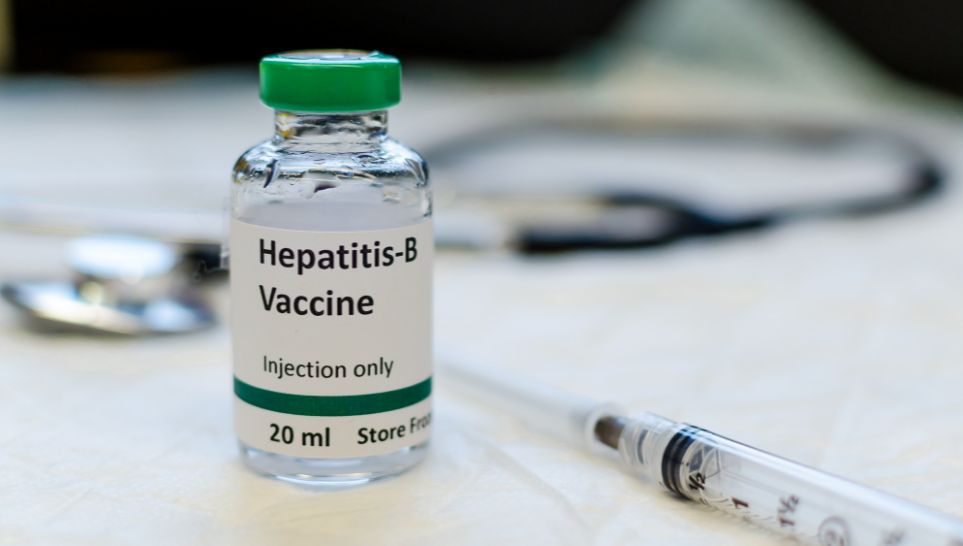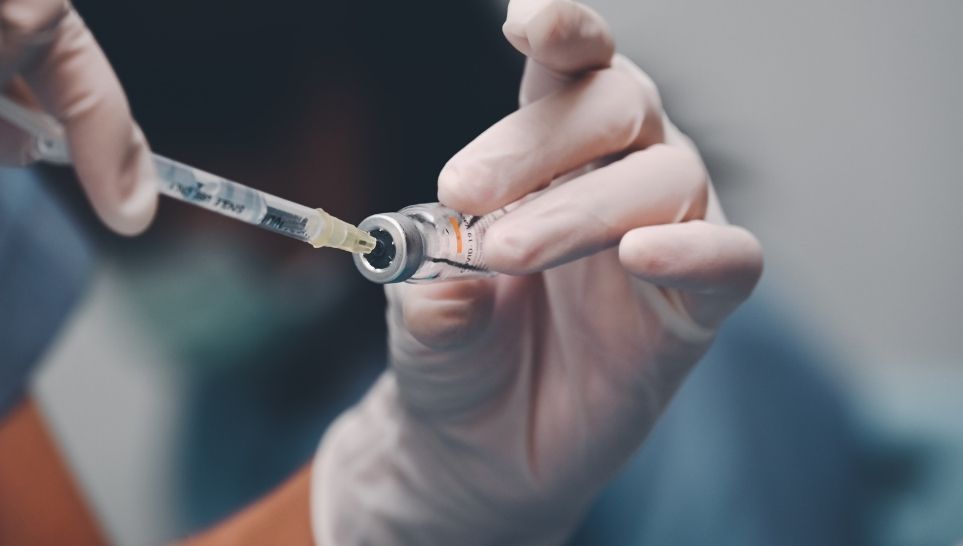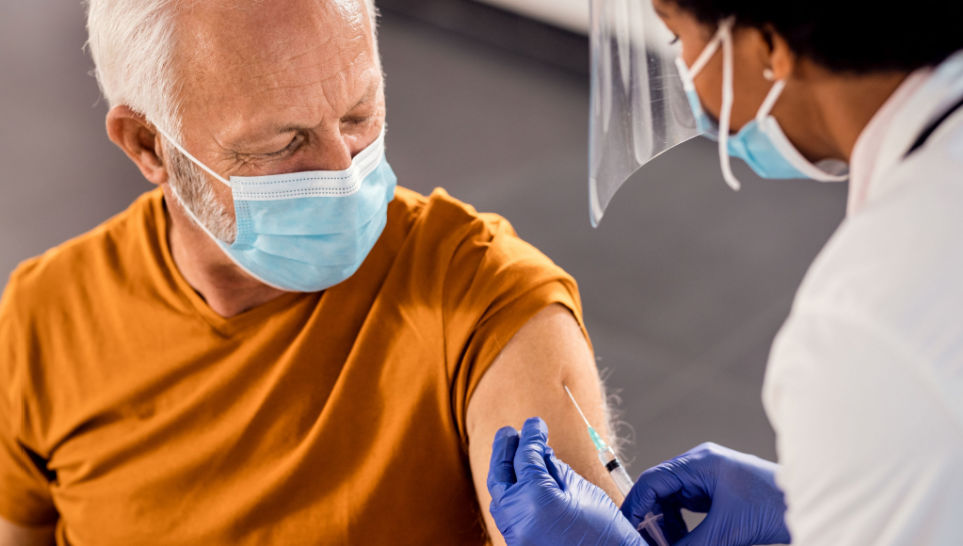
When was the last time you had your annual flu shot? Most Americans don’t think twice about getting a COVID or influenza vaccine. In fact, vaccines have diminished or even eradicated many diseases that were killers of children and adults in the past.
However, vaccinations may not always be safe. Sometimes, inexperienced vaccine administrators make a mistake and inject the needle in the wrong spot, causing a shoulder injury known as bursitis. If you’ve experienced bursitis from a vaccine in New Jersey, you may be eligible to seek compensation for your injury.
At Sadaka Law, we work with New Jersey clients who have suffered injuries related to vaccine administration, including bursitis. As experienced vaccine injury lawyers, we have an extensive network of resources and the medical background required to handle these cases.
In this post, we’ll discuss all the important details you need to know about bursitis and other shoulder injuries that can occur from vaccine administration, including symptoms, treatment, and how to seek compensation.
What is Shoulder Bursitis from Vaccine Administration?
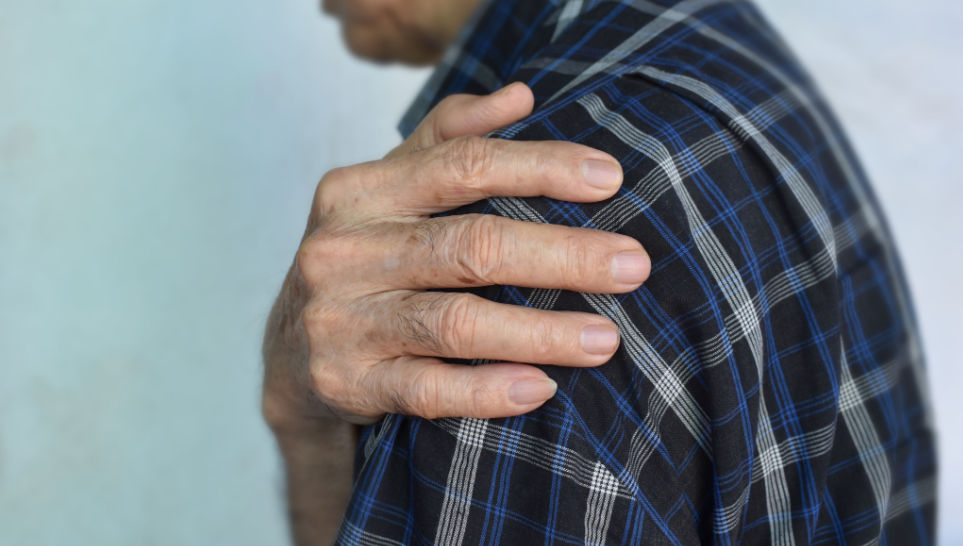
Bursitis is an injury that causes painful swelling around the body’s joints. While it can occur in the feet, elbows, and knees, it’s most common in the shoulder. People who put a lot of stress or pressure on their joints (i.e., from repeated motions) can develop bursitis, but that’s not the only cause of this serious injury.
A healthcare worker who doesn’t follow the proper injection technique while administering intramuscular vaccines can cause serious trauma. One such condition is known as a shoulder injury related to vaccine administration, or SIRVA.
Common SIRVA injuries include bursitis, adhesive capsulitis, impingement syndrome of the shoulder, or torn rotator cuff tendons. Although developing bursitis from a faulty vaccine is a rare injury, the worst part is that it’s 100% preventable.
Most people who receive a vaccine will experience shoulder pain and stiffness for a day or two afterwards. However, people with vaccine-related shoulder dysfunction like bursitis suffer from debilitating and intense pain for weeks, months, or even years.
When a vaccine injection site is too high on the deltoid muscle or too deep, it can cause bursitis. When this happens, the needle penetrates the bursa, a fluid-filled sac that surrounds the shoulder joint and allows for comfortable and flexible arm movement. Once the bursa sac experiences trauma, it causes severe pain in the affected shoulder and may even limit mobility if left untreated.
Having a needle puncture the bursae around your shoulder joints isn’t the only serious trauma and debilitating pain that can occur when an inexperienced or incompetent administrator injects a vaccine antigen incorrectly. Sometimes, the needle can pierce the synovial tissues that lie in a cavity below the deltoid muscle, causing an immediate reaction of inflammation and swelling that usually persists for weeks or even months.
Symptoms of Shoulder Bursitis
For a person suffering from a bursitis shoulder injury related to vaccine administration, the first symptom is usually the rapid onset of sharp, stabbing, and excruciating pain. Most people that suffer from shoulder bursitis experience the onset of their first symptoms anywhere between zero to 48 hours after receiving a COVID vaccination, influenza vaccination, or any other type of vaccine.
The most common symptoms of deltoid bursitis that people experience include:
- Muscle aches and stiffness
- Stabbing shoulder pain
- Limited range of mobility
- Frozen shoulder
- Prolonged, chronic pain
- Swelling and redness at the injection site
How Is Shoulder Bursitis Diagnosed?
The key to an accurate diagnosis of a shoulder injury related to vaccine administration is recognizing that the patient only began to experience pain within the first two days after receiving their vaccination. Of course, a diagnosis is much easier in patients who don’t have a prior medical history of shoulder injuries, inflammation, or chronic shoulder pain.
Furthermore, it requires more than just a physical examination to diagnose vaccination-related shoulder dysfunction such as bursitis. These are the most accurate diagnostic methods:
- X-rays (either left shoulder or right shoulder)
- Joint aspiration
- Ultrasound or MRI
Many people who suffer from a shoulder injury related to vaccine administration don’t realize that their vaccination is the cause of their ongoing pain. Therefore, they don’t seek treatment as quickly as they should or use over-the-counter pain medications that fail to relieve their symptoms.
How Can You Avoid Getting Bursitis from a Vaccine Administration?
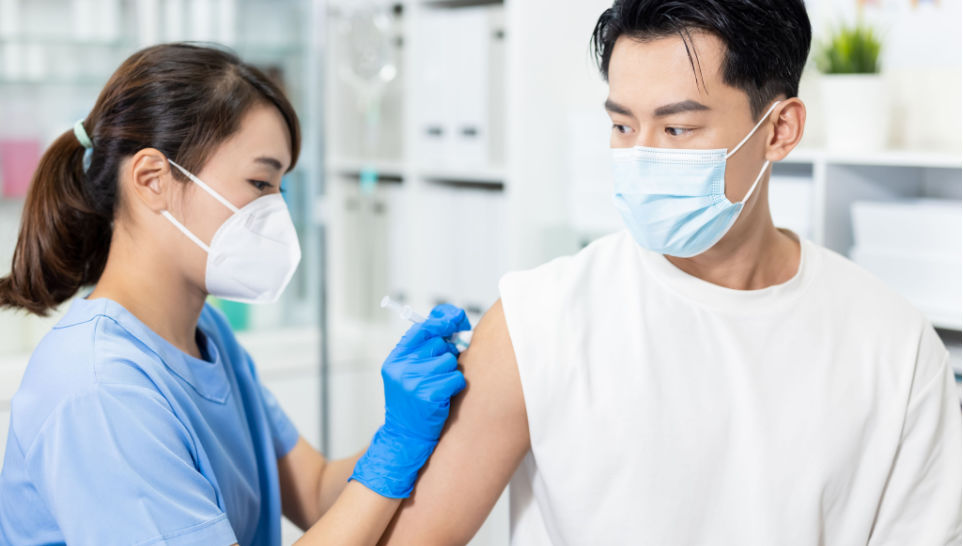
Remember, the placement and technique of administering a vaccine shot directly affect the chance of a patient getting shoulder bursitis. So, as long as the medical professionals administering your vaccine have proper training and know the correct placement for the injection site, there shouldn’t be a problem.
However, there’s an issue: with the onset of the first pandemic in over 100 years, our nation has needed more and more volunteers to administer COVID vaccines to the general public. Under those circumstances, the less experienced healthcare workers have had to step up and perform procedures they weren’t comfortable with yet, such as vaccine administration. Inevitably, this has led to mistakes and an increased risk of patients receiving a vaccine injury due to a misplaced injection in the deltoid muscle.
Fortunately, the Centers for Disease Control and Prevention offers valuable information and video resources regarding proper vaccination techniques. However, here are some tips you can keep in mind for preventing a vaccine injury next time you get a COVID or influenza vaccination:
- Seek medical treatment if you have persistent, sharp shoulder pain that lasts beyond a few days.
- Wear a t-shirt or loose clothing you can easily move to reveal your entire upper arm to provide unhindered access
- Only receive a vaccine from a trained medical professional
Standard Treatment Protocols for Bursitis
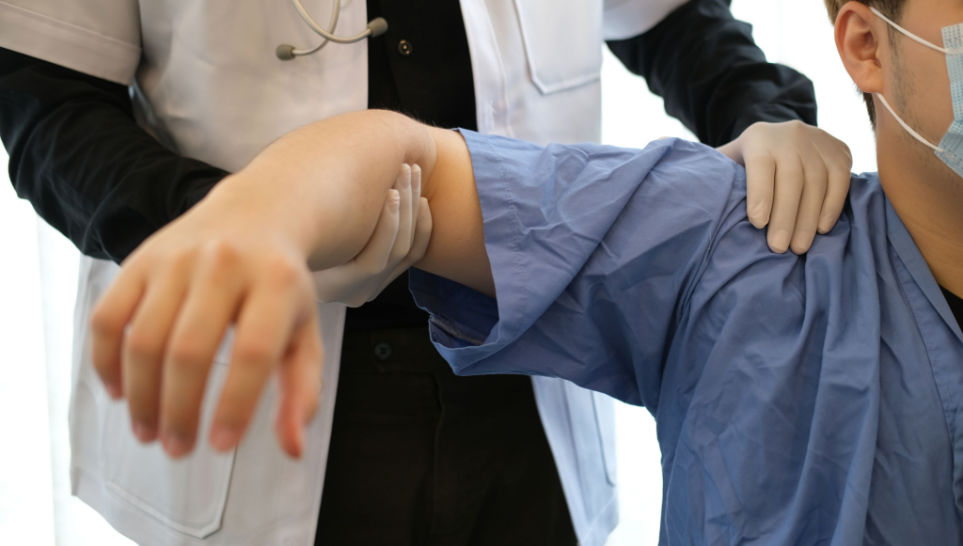
The type and severity of your bursitis shoulder injury will determine the level of treatment you need. For mild cases, the shoulder pain may resolve itself within a week or two, or the patient can opt for physical therapy. However, for more severe cases (like a torn rotator cuff), the patient may have to take anti-inflammatory medications, corticosteroid injections, bursa injections, or even undergo surgery.
How Long Does It Take To Recover From Vaccine Bursitis?
Again, the recovery time for vaccine-related bursitis shoulder injuries varies based on the severity of the damage. Mild cases with minimal trauma to the soft tissues and bursae may go away independently. Moderate injuries may require anti-inflammatory medication or physical therapy. However, chronic and severe cases can last for months or even years, causing more damage to the affected area if the patient doesn’t seek treatment.
Can People With a Bursitis Diagnosis File a Lawsuit?
Although COVID and flu vaccine-related shoulder bursitis is relatively rare, it does happen – and so do other injuries caused by faulty vaccine administration. For this reason, victims of these injuries may recover compensation from the Vaccine Injury Compensation Program, or VICP.
The government has paid billions of dollars to people who suffered from vaccine-related injuries. This organization provides legal recourse and financial compensation for victims of vaccine bursitis and other related injuries.
How To Seek Compensation for a Bursitis Vaccine Injury
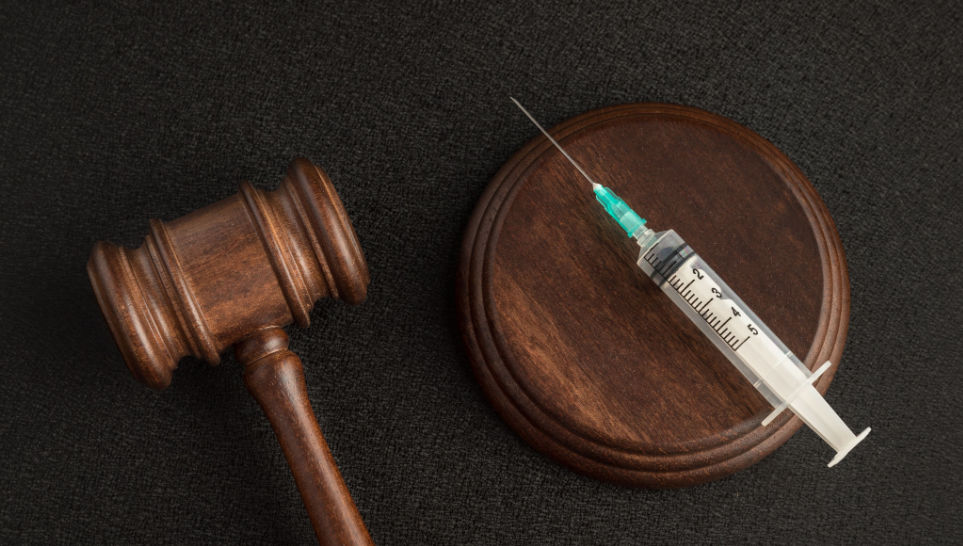
At Sadaka Law, we have helped people all over the United States seek a monetary settlement from the Vaccine Injury Compensation Program to help cover their financial obligations and other expenses. Here are the four steps to take for people who wish to recover compensation from the VICP:
1. Call Your Doctor
If you have a shoulder injury related to vaccine administration, call your doctor and report your symptoms. Do not wait, as this can result in greater damage to your body.
2. Report Your Injury to VAERS
The federal government and the Centers for Disease Control created the Vaccine Adverse Event Reporting System, or VAERS, to track adverse vaccine effects and injuries in America. You’ll need to contact the agency to report your injury, which you can do here on the VAERS website
3. Hire a Vaccine Injury Lawyer
Next, find a vaccine injury lawyer with experience handling bursitis and SIRVA cases. Don’t worry; our firm will help you understand every step of the process, advocating for your best interests.
4. File a Claim with the VICP
Finally, negotiations will begin between you and the claims adjuster at your insurance company. If settlement talks fail and neither side can compromise, we’ll file a personal injury lawsuit.
What Type of Compensation Does VICP Cover?

The Vaccine Injury Compensation Program offers monetary assistance to individuals who have suffered from a vaccine-related injury, such as bursitis or a torn rotator cuff. If your case qualifies, you may receive compensation for the following:
Lost Wages
If your injury was severe enough that you could not continue working and lost income, the VICP may reimburse you for those lost wages. Even people who receive workers’ compensation may be eligible. In those cases, we can seek the difference between your lost wages and workers’ compensation.
Medical Expenses
Suffering from a serious injury like bursitis in your upper arm or a torn rotator cuff requires intensive medical treatment, and that doesn’t come cheap. However, you can ask VICP to cover all your medical expenses related to your injuries, such as physical therapy or corticosteroid shots. But, there’s an exception: if you have state Medicaid pay for some or all of your treatment, you may not be eligible for reimbursement.
Pain and Suffering
The specific circumstances of your case will impact the amount of monetary compensation you can receive for the pain and suffering your vaccine injury caused. Key criteria that influence the final award include the type and duration of your treatment, the severity of your symptoms, and the effects on your future and quality of life.
Did You Get Shoulder Bursitis from a Vaccine in New Jersey? Don’t Wait – Call Sadaka Law Today!
Generally speaking, getting a COVID vaccine and flu shots are safe. However, human error and ineptitude have caused many vaccine injuries across the country. If you’ve suffered a shoulder-related injury or bursitis from a vaccine or flu shot in New Jersey, you may be eligible to pursue a claim with the Vaccine Injury Compensation Program.
The claim process is complex, which is why Sadaka Law is here to provide you with professional legal help. As experienced attorneys, we’ve handled vaccine injury cases for people all over the US.
Call Sadaka Law today at (800) 810-4139 in Englewood, NJ, to schedule your vaccine-related bursitis case consultation.




